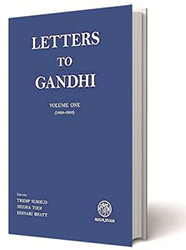
Some men changed their times...
One man changed the World for all times!
Comprehensive Website on the life and works of
Mahatma Gandhi
+91-23872061
+91-9022483828
info@mkgandhi.org

+91-23872061
+91-9022483828
info@mkgandhi.org
Letters to GandhiWho were the people who wrote letters to Mohandas Karamchand Gandhi? |
C. Rammanohar Reddy*  The first volume covering the years 1889-1900 has been put together with great care by the editors, and gives a glimpse of a journey in the making. We know that Mohandas Karamchand Gandhi was a prolific correspondent who wrote letters on everything from the mundane to how to win independence. What of his correspondents? Who were the people who wrote to him? What did they write about? The Collected Works give us all that Gandhi wrote, but not what his correspondents wrote to him. That gap is now being rectified. We now have the first volume of an ambitious project to publish all such letters that have been maintained at the Sabarmati Ashram. There are apparently 8,500 of them in Sabarmati. The aim is to publish a multi-volume, multi-language annotated collection of these letters. The first volume covering the years 1889-1900 has been put together with great care by the editors, and gives a glimpse of a journey in the making. All (except one, written to Gandhi in England) cover his first decade in South Africa. The larger proportion here is of correspondence with colonial officials, acknowledging, and, sometimes, commenting on the testimonials and petitions that Gandhi began writing on behalf of the Indians in Natal. There are a few letters from the early Indian nationalists. Some like Dadabhai Naoroji and MM Bhowanagree, the MPs in England, wrote in the 1890s responding to Gandhi’s requests. There were also a few in India like MG Ranade, who recognised the value of what this lawyer was doing in South Africa. Much of the correspondence is routine, but even the routine can be interesting in their quaintness, like CB Cooke, a barrister, in July 1895 giving a break-up of his fees and insisting that they are correct. We have Gandhi’s early colleagues in organising the Indians, like HO Ally, writing, sometimes in disagreement, about the methods to be followed. There are English correspondents, too, some curious about what this Indian lawyer was up to. There is a visiting correspondent of The Times of India, engaged in preliminary correspondence (the editors tell us) about plans for a publication — which was eventually to become in 1903 the Indian Opinion. The couple, the Police Superintendent RC Alexander and his wife Jane Alexander, who on 13 January 1897 saved Gandhi from an attack by a mob in Durban intent on murder, write on 22 January in reply to a letter with a memento in thanks from Gandhi. It is unfortunate that Gandhi’s own correspondence on these letters is not to be found for the most part in the Collected Works. The communications from family and friends in India, too, are not here. Nor are there any from some leaders like Bal Gangadhar Tilak and Gopal Krishna Gokhale. These letters were all brought from South Africa more than a century ago. So many must have been lost or destroyed enroute and over time. However, we still have gems with us. Like the extended correspondence in November, 1895 by “Captain Hitchins’ Indentured Servant Madurai”, who ends his letter on November 11, 1895, with the plea: “It is the talk of the Colony that the Indentured Indians receive protection from you and also your name is famous everywhere. Wherefore I request you very much to protect me”. By the late 19th century, Gandhi’s reputation had already travelled in other directions in southern Africa. On 5 April 1898, an Ahmed Effendi writes from Bulawayo in neighbouring Rhodesia. He “has heard so much” about Gandhi and asks him to start a paper there to highlight the conditions of the Indians “who are treated very harshly”. The editors of the volume have carefully transcribed the letters and given detailed annotations and cross-references wherever possible. One wishes though that the quality of production was better; the facsimiles of the handful of letters that have been printed could have then been read more clearly. No matter. The first product of this wonderful venture is with us. One hopes the remaining volumes will be published quickly. One cannot wait to read the letters written to Gandhi as first the agitations in South Africa pick up, then, during the initial years in India, and, finally, in the decades leading up to Independence. Courtesy: The Indian Express, dt. 16.12.2017 * C. Rammanohar Reddy is a writer and commentator based in Hyderabad. |